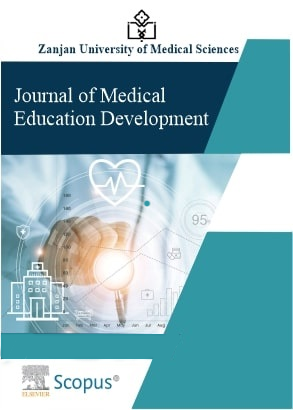- A roadmap for transforming medical education
Kourosh Amini * - Feasibility study and implementation of a questionnaire on the effectiveness of PhD curricula for knowledge management at medical universities in Iran
Shokouh Sedghi, Fereshteh Sepehr *, Abolfazl Golestani - Barriers to implementing findings from theses and dissertations: a qualitative study
Mostafa Rad, Mansoureh Feizabadi, Hossein Assarzadeh, Reza Chaman, Hamideh Yazdimoghaddam, Seyed Alireza Javadinia * - Identifying the opportunities and challenges of educational accreditation in teaching hospitals: a qualitative study
Mohanna Rajabi * - Strategies in implementing the vision and mission of the medical school: a qualitative study of academic community perceptions
Surya Akbar *, Tezar Samekto Darungan, Halimah Thania Nasution, Dinda Saufia Rahmah - The effects of blended learning on nursing students' cultural competence and empathy: a quasi-experimental study
Mohammad Gholami, Shourangiz Beiranvand *, Shirin Hasanvand, Yaser Mokhayeri - Student views of a flipped classroom and case-based learning session informed by the PERMA well-being model: a pilot study among fourth-year medical students
Klaita Srisingh *, Kornthip Jeephet - Spiritual care competence in nursing students: the predictive roles of spiritual well-being and emotional intelligence
Saba Rajabi Pour, Mehrnaz Ahmadi *, Atiye Dadanjani - Psychological factors affecting self-regulated learning among students: an application of the health action process approach
Reza Pournarani *, Ehsan Movahed, Reza Faryabi, naser nasiri - The effect of instructors' caring behavior on nursing students' professional self-concept: a descriptive-correlational study
Azar Eshghi *, Nasrin Bahrami Nejad, Nasrin Jafari Varjoshani - Relationship between fear of negative evaluation and clinical decision-making among nursing students: a cross-sectional study
Parisa Nezhadhoseini, Kourosh Amini *, Farhad Ramezani-Badr, Mohammad Abdi - Assessing knowledge and attitudes toward palliative care among internal medicine residents: a cross-sectional study
Hossein Jabbari Beyrami, Azita Fathnezhad-Kazemi, Shalaleh Aghaei * - Exploring applications of artificial intelligence in enhancing the quality of medical education: a mixed methods research synthesis
Reza Mahdi, Ahmad Keykha *, Rogers Kaliisa, Fatemeh Darabi - Advancements in simulation-based assessments for health professionals: insights from a scoping review
Zahra Siavashpour, Zohreh Khoshgoftar, Somaye Sohrabi, Sarvin Bosak * - National assessment and accreditation council (NAAC) for physiotherapy institutes: a review of processes and unique challenges
Avi Choudhary, Himani Kaushik * - Acceptable use policy: an ethical imperative in medical education
Zohrehsadat Mirmoghtadaie, Somayeh Shapoori *
- PAL-Jigsaw: a hybrid cooperative learning model in medical education
Amanda Tifanny Nur Fauziyah, V Dwi Jani Juliawati, Christopher David Kurniawan, Bayu Perkasa Rosari, Darmadi Darmadi, Sem Samuel Surja * - Effectiveness of video-assisted vs. face-to-face learning in surgical knot-tying skills: a randomized controlled pilot study
Akile Zengin *, Orkhan Ulfanov, Yusuf Murat Bag, Yavuz Selim Angin, Murat Ulas - Unpacking readiness competence: a descriptive qualitative study of health students in interprofessional online learning
Riska Cahyani Zahra, Enita Dewi *, Johari Daud Makajil, Hamidah Hassan - Predictors of academic procrastination in Iran: distinguishing between problematic use, intensity, and procrastinatory use of social media
Hatef Tirgari Seraji, Amirhossein Rasouli, Faramarz Ramzi, Omid Saed * - Self-directed learning readiness among medical students: an observational study
Giti Karimkhanlooei *, Somayae Abdollahi Sabet, Fereshteh Pashazadeh - Medical students' perceptions of the impact of problem-based learning on critical thinking and collaborative learning
Pradeep Kumar Sahu *, Maya Jurawan, Kristin Ramdeen, Aimee Seeram, Britney Dookie, Mya Gould - Unspoken power dynamics and the hidden curriculum in allied medical education: a qualitative study of lecturer–student relationships at the University of Calabar
Emmanuel Okon Enang *, Sandra Agiounim Imam, Ezra Onyedikachi Madu, Ofonime Esangubong Lawson, Blessing Etuk, Tommy Adah Adah - Simulation-based instruction: student enjoyment of a computer-based practical activity
Tarig H Merghani *, Nizam Arshad Khan, Husham Taha, Azza O Alawad
Journal Metrics
Time to First Decision: 23.8 days
Time to Final Decision: 163 days
Time to Publish: 101.8 days
Acceptance Rate: 15.84%

This work is licensed under a Creative Commons Attribution-NonCommercial 3.0 Unported License which allows users to read, copy, distribute and make derivative works for non-commercial purposes from the material, as long as the author of the original work is cited properly.
Acceptance Rate: 15.84%

This work is licensed under a Creative Commons Attribution-NonCommercial 3.0 Unported License which allows users to read, copy, distribute and make derivative works for non-commercial purposes from the material, as long as the author of the original work is cited properly.





.png)



